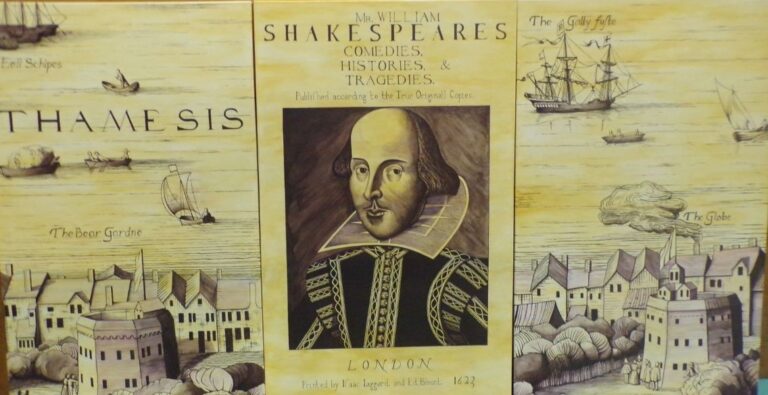Insights from Insights’23: Shakespeare UnBard at HMP Stafford

A much-valued contributor to the Insights festival, Shakespeare UnBard sees theatre companies and people in prison working together to adapt and perform Shakespeare plays.
Richard Lakin visited Shakespeare UnBard at HMP Stafford as part of Insights 2023 and shares his experience watching the group rehearse for their upcoming production of Shakespeare’s tragedy, King Lear.

Richard Lakin
Communications Manager,
Change Communications & Engagement,
HMPPS
‘Who is it that can tell me who I am?’ King Lear asks. His booming voice could shake the prison walls.
‘Shut it,’ a voice calls from outside, but Lear continues undeterred.
HMP Stafford is a perfect dramatic backdrop for Shakespeare. Towering brick walls are topped by barbed wire and the jangle of keys and chatter of the yard can be heard beneath us.
The prison dates back to the eighteenth century with majors and captains among the roll call of governors. It houses around 700 men convicted of sex offences undergoing training and rehabilitation.
Performance workshops are led by Dr Rowan Mackenzie, founder of Shakespeare UnBard, which works in prisons across the Midlands.
A few of the men taking part have acted or written before while others admit they struggle to utter a few words in the presence of strangers.
Two of the men – one shy and quiet and another enjoying the chance to share his latest lyrics – discuss the ribbing they get for attending the workshops.
The quieter man, in his forties, is preparing to give Marc Antony’s speech. He says: “I had no idea what I was signing up to. Some people on the wings think it’s all men in tights prancing about. But it’s really changed the way I think and I’ve gained confidence.”
“I’ve never done anything like this, but I keep coming back. It works for me.”
This morning’s session is about the performance of pieces the men have created. These include a comic piece about a critical mother, a Shakespeare-inspired song, an interrogation of Portia, and teenage diary pieces from Juliet. Prison catering gets skewered in a poem pouring scorn on sprouts and flapjack.
Not all share the confidence of the first performers. One man hesitates, despite encouragement, but later, he’s persuaded up, trembling and short of breath, to complete his lines and his shoulders lift as he’s applauded.
Rowan knows her work here will receive criticism from some quarters. She points out some of the men are due for release and performing helps their confidence as they seek a job and accommodation.
“They aren’t locked up here forever. They will return to society and so it’s important we work with them. A prison sentence is the deprivation of liberty, it should never be the deprivation of humanity.” Supporting people on prison to get a job is key to aiding rehabilitation; for example helping to develop confident speaking in an interview is a role the creative arts such as this can really assist with.
Rowan claps her hands and calls the men of Emergency Shakespeare (HMP Stafford’s permanent theatre company) together for the afternoon rehearsal of King Lear. Time is tight and, in a few weeks, they will perform it to an audience. She keeps it moving, as some lines are fluffed, the odd entrance late or exit forgotten.
But it is all coming together and the performance is often intense, viewed from our arc of chairs a few metres away.
A play chosen by the men is put on every six to eight months, following weekly rehearsals.
“I might not understand the words, but I get the feeling,” one man says. Another enjoys the rhythm and flow of the speeches.
As poor Gloucester is blinded in Act Three, a prison officer calls up to Rowan from the yard below to check all is well.
The swords might be made of papier-mâché, but it’s a creative, spontaneous and lively environment Shakespeare would recognise.
